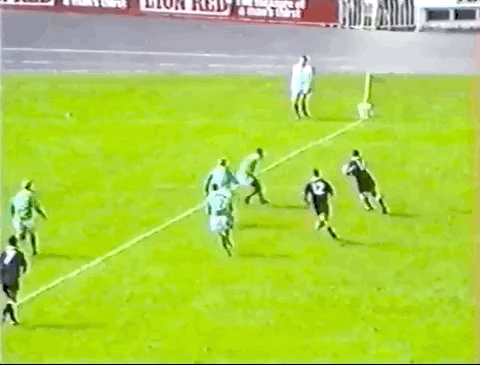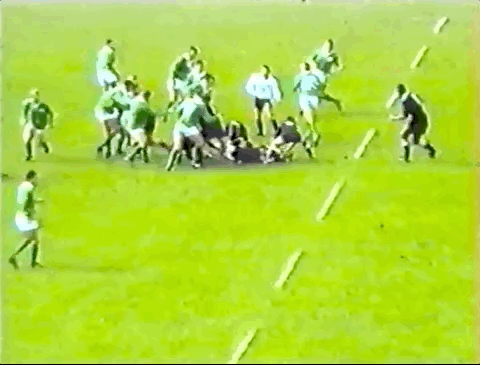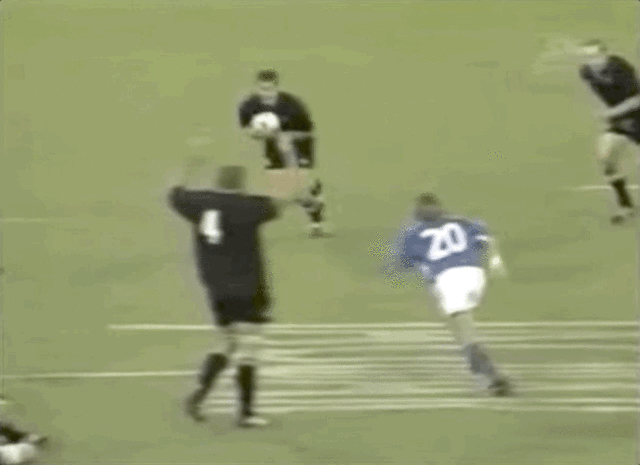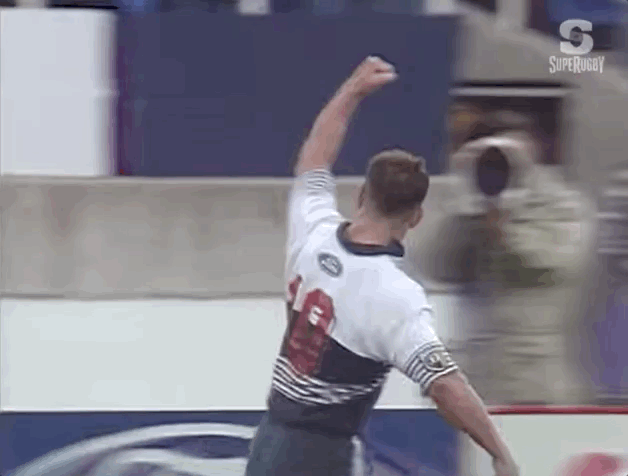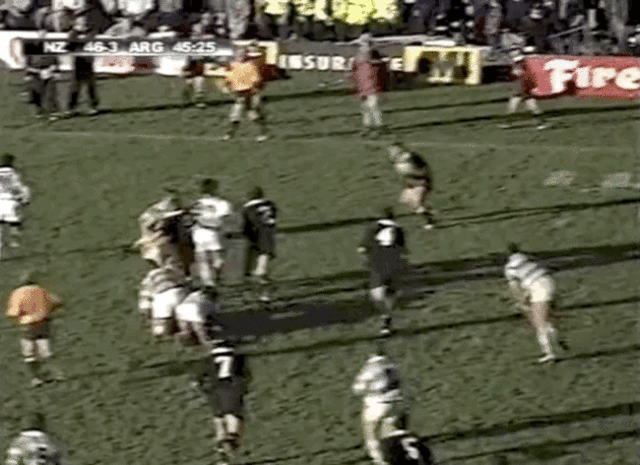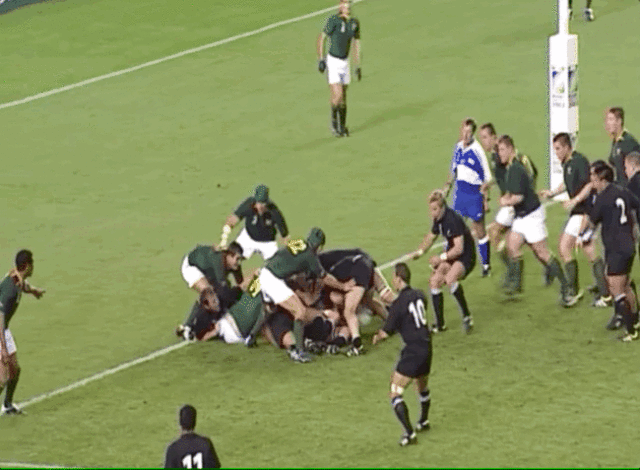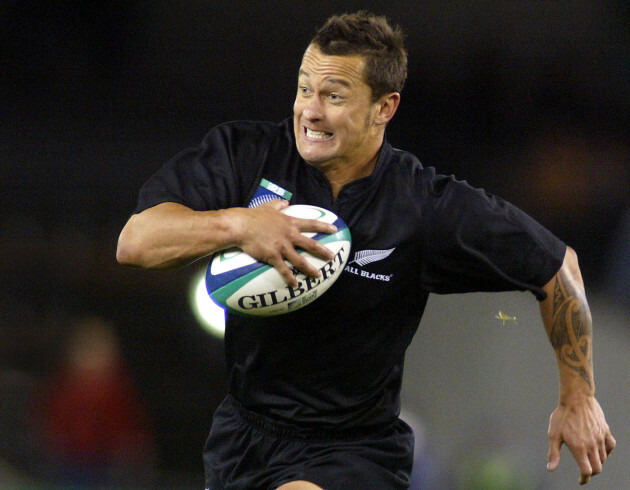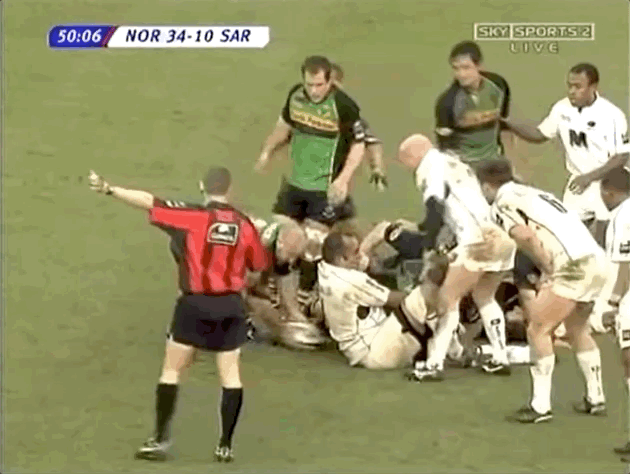LAST UPDATE | 1 Jun 2020
This article is a part of Genius Week, a series of features reflecting on sporting genius in its many different forms.
In this piece, we reflect on the career of the mercurial Carlos Spencer.
__________
DECLAN KIDNEY AND his Ireland Schools team got a little taster of what was to come from Carlos Spencer when they almost beat their Kiwi counterparts in New Zealand in August 1992.
Anthony Foley’s try from a close-range lineout maul had helped the Irish side into a surprise 13-0 lead early on in New Plymouth but two tries from the 16-year-old Spencer – playing at inside centre for the Kiwis – were crucial just before half-time.
John Philpott’s place-kicking allowed Ireland to reopen their lead after the break but a late converted try from Jonah Lomu – who was at number eight – closed the gap again.
Fullback Jeff Wilson then slotted a penalty with the final kick of the game to break Irish hearts and hand the Kiwis a 27-25 win.
[Click here if you cannot view the clip above]
Spencer’s tries – a finish from Wilson’s offload above and the second after Lomu’s surge below – don’t really hint at the moments of rugby genius he would later produce, but ‘King Carlos’ was clearly on the way up.
[Click here if you cannot view the clip above]
Spencer became known as one of the greatest mavericks to ever play the game, a showman of an out-half who loved to thrill supporters.
His attacking skills were jaw-dropping. Dummy passes, goose steps, side steps, skip passes, offloads, dummy releases and regathering of the ball, between-the-legs passes, heel kicks, knee chips [see below], cross-field kicks, back-over-the-ruck kicks, backheel grubbers – Spencer had a sensational repertoire.
He had flaws too, with his goal-kicking and defence inconsistent. There were errors that cost his teams along the way and he could frustrate coaches and team-mates, but Spencer was unwilling to change for anyone.
A flawed genius, maybe, but a rugby genius nonetheless.
[Click here if you cannot view the clip above]
“Entertainment is a big part of rugby and it is one of the reasons I love the game so much,” said Spencer in 2005. “I get excited about pulling off tricks and being cheeky.
“I have had a bit of grief when I have tried things which have not come off, but not one coach has ever tried to change my thinking. It’s not the case that I go against game plans, but when a match opens up you should not be afraid to express yourself.”
Sadly, there aren’t too many like Spencer in the game nowadays – relentlessly attacking players who delight supporters and attract new ones to the game with their array of skills. He wasn’t quite one of a kind but Spencer was something special.
Spencer’s rugby journey had humble beginnings in the little Kiwi town of Levin, just under 100km north of Wellington.
He later admitted that he came close to focusing on softball over rugby as he came through in Waiopehu College but his talent in New Zealand’s national sport was unmissable.
He helped his school to finish second in the World Schools Championships in 1992 and was named in the dream team at that tournament, while he debuted for the senior men’s Horowhenua-Kāpiti provincial team the same year while still only 16.
Ireland gave them a real fright but that 1992 NZ Schools team including the likes of Spencer, Lomu, Wilson, Isitolo Maka, Carl Hoeft, Trevor Leota and Daryl Gibson is still seen as one of the most talented ever. Spencer scored a try when they hammered Australia 31-8 over in Sydney a few months later.
He was back in the NZ Schools team in 1993, the same year he helped Horowhenua-Kāpiti to the NPC third division title and caught the attention of Graham Henry when they faced his Auckland side in a Ranfurly Shield challenge.
Horowhenua-Kāpiti were hammered 80-17 but Spencer scored a brilliant solo try. So it was off to Auckland in 1994, while Christian Cullen followed in his footsteps with Horowhenua-Kāpiti.
[Click here if you cannot view the clip above]
With Henry as his boss, Spencer excelled in Auckland, helping the province to NPC titles in 1994 and 1995. He initially worked as a courier alongside what was still amateur rugby back in those days, but his mercurial talent was ideal as professional rugby kicked off and looked to excite new fans.
Super Rugby launched in 1996 and it was fitting that Spencer played for the Blues in the very first game of a competition that would become synonymous with thrilling attacking rugby.
Spencer scored a try in the opening win over the Hurricanes and was on the scoresheet in the final too as the brilliant Blues – Lomu, Sean Fitzpatrick, Zinzan Brooke, Michael Jones, and Craig Dow were part of that team – overcame the Natal Sharks to claim the first-ever Super Rugby title.
Spencer and the Blues repeated the feat in 1997, the same year Spencer made his Test debut for the All Blacks. The 21-year-old Spencer scored 33 points and had moments of magic like the one below as the Kiwis dismantled Argentina.
[Click here if you cannot view the clip above]
Despite the fast start, Spencer soon discovered a few hurdles, with Andrew Mehrtens often preferred at out-half by the All Blacks. Meanwhile, the Crusaders took over as Super Rugby’s dominant force and won three-in-a-row.
Spencer was injured for the 1999 World Cup but he continued to entertain in the years that followed and was back at a peak for the 2003 Super Rugby campaign as he led a new version of the Blues to their third title.
It was a stunning Blues team, one of the most exciting club sides ever assembled. Doug Howlett, Joe Rokocoko, Rupeni Caucaunibuca, Mils Muliaina, Justin Collins, Ali Williams, Keven Mealamu, Tony Woodcock, Sam Tuitupou – there were sensational players everywhere and Spencer was the perfect man to bring it all together at 10.
Later that year, Spencer went to the 2003 World Cup as New Zealand’s first-choice out-half, with head coach John Mitchell preferring him to the prodigious Dan Carter.
Spencer lit the tournament up as the All Blacks hammered Italy, Canada and Tonga before a win over Wales handed them a quarter-final against the Springboks, the stage for one of the most exhilarating passes in World Cup history from Spencer.
The All Blacks had turned over the Boks after a five-metre defensive scrum and Justin Marshall’s pass to Spencer was a little loopy. The out-half reacted perfectly to put Rokocoko away.
[Click here if you cannot view the clip above]
The All Blacks won 29-9 but then came up short in the semi-final against Eddies Jones’ Wallabies, when Spencer led the haka.
He had more moments of magic in attack but Spencer also saw a long pass picked off by Stirling Mortlock for a crucial intercept try as the Aussies went on to win 22-10.
Jones wrote in his autobiography last year that part of the Wallabies’ strategy had been to “force Carlos Spencer to take risks. He is a brilliant player without any pressure. But we know that he is fallible when under the hammer.
“Spencer always goes for the big play then and he makes mistakes.”
A third-place finish after beating France was scant consolation for Spencer, who was heading into his final year with the All Blacks in 2004.
Peter Sloane was the head coach who guided the Blues to their 2003 title and was regarded as an experienced man manager who could get the best out of Spencer, but the out-half didn’t get on as well with assistant coach Joe Schmidt, who came on board in 2004.
Sloane was keen for Schmidt to bring more structure to the Blues’ play, something that didn’t sit well with Spencer. The out-half wasn’t quick to get on board with the new approach as the Blues struggled for form, and Spencer was even dropped at one point.
“Joe copped a lot of flak from the media in Auckland,” said Sloane last year. ”They blamed Joe for being part of that, but it was just where we had to go as a team.”
While 2004 wasn’t the happiest time, Spencer did deliver one of the most memorable moments of his career, one that perhaps summed him up, in the clash with the Crusaders.
The Blues led 31-29 with less than a minute remaining when Spencer opted to start an attack from behind his own tryline before following up to race clear for the try. He was heading in underneath the posts but suddenly veered right and casually strolled towards the corner flag before dotting down. [Watch from 1.43 below]
Having sickened the Blues’ bitter rivals, Spencer then proceeded to slot the touchline conversion and deliver an ‘up yours’ salute to Crusaders fans.
Spencer played for the All Blacks in 2004, remaining a starter but his move to Northampton in England signalled the end of his international career after 35 caps and 291 points [sixth on the all-time list], just as Carter moved to the next level and showed his world-class ability against the Lions.
Spencer had an emotional goodbye in helping the Māori All Blacks to beat the tourists 19-13, having led the haka with Rua Tipoki.
Premiership fans were in for a treat with Spencer’s arrival in Northampton. Among the highlights in his first season was this audacious overhead kick and regather to tee up what should have been a Saints try against Saracens.
[Click here if you cannot view the clip above]
The tricks continued but Northampton had a tough period on the field, getting relegated in 2006/07, meaning Spencer played a season in what was then the semi-professional second-tier National League One.
Saints jumped straight back up but Spencer’s playing career was on the wind down at this stage. He moved to Gloucester for the 2009/10 campaign and then ended his professional playing days with a spell in South Africa with the Lions.
He shifted into coaching with the Lions, then had spells with the Sharks and Kings, the last of those ending unhappily with Spencer quitting amid claims the South Africa club owed him a substantial amount of money.
He had a two-season spell coaching in Japanese club rugby but returned to New Zealand last year to join the Hurricanes, where he is an assistant coach to former Munster centre Jason Holland.
Spencer still looks in superb shape and even made a guest appearance for the Blues in 2017 at the Brisbane Global 10s competition.
During this lockdown, Spencer has been showing he’s still got some ridiculous rugby skills in his son’s TikToks like the one above.
It remains to be seen where the 44-year-old’s coaching career takes him but Spencer is content to be in the background these days.
“I’ve got no aspiration to be a head coach at all. That’s not my cup of tea,” he told Stuff last year. “Just dealing with that pressure, you’ve got to be a certain type of individual to want to be a head coach and I’m certainly not that.
“That’s not a bad thing.
“I’m just comfortable doing what I’m doing.”

